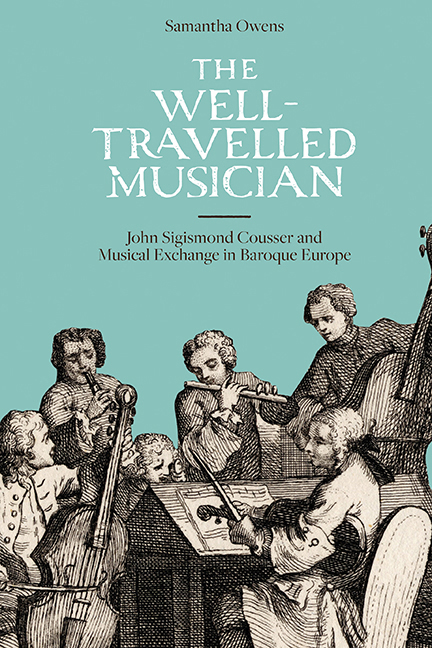Book contents
- Frontmatter
- Dedcation
- Contents
- List of Tables
- Preface
- Abbreviations
- Notes on Sources
- Introduction: John Sigismond Cousser and his ‘Commonplace Book’
- 1 Hungarian Beginnings and the Adoption of French Musical Style
- 2 Kapellmeister at the Wolfenbüttel Court and Braunschweig Opera House
- 3 Ariadne to Porus: Cousser's Braunschweig Operas
- 4 ‘The Incomparable Director’ in Hamburg, Nuremberg and Augsburg
- 5 Heliconische Musen-Lust: Opera at the Württemberg Court
- 6 ‘Il Paradiso terrestre’? Cousser in London
- 7 ‘Fortune not Blind’: Music for Dublin Castle
- 8 ‘Our Concert’: A Musician at Home
- 9 Cousser's ‘collection of fine musick’ and the Practicalities of Musical Exchange
- Appendix 1 Summary of the Contents of Cousser's ‘Commonplace Book’
- Appendix 2 Cousser's Address Book
- Appendix 3 Cousser's Books of Cantatas, Madrigals, Duets and Serenatas
- Appendix 4 Cousser's Inventory of Ouverture Incipits
- Appendix 5 Transcription of Cousser's Notes for his 1716 Trip to London and the Continent
- Bibliography
- Index
- Titles listed here were originally published under the series title Music in Britain, 1600–1900
- New titles published under the series title Music in Britain, 1600–2000
2 - Kapellmeister at the Wolfenbüttel Court and Braunschweig Opera House
Published online by Cambridge University Press: 30 August 2019
- Frontmatter
- Dedcation
- Contents
- List of Tables
- Preface
- Abbreviations
- Notes on Sources
- Introduction: John Sigismond Cousser and his ‘Commonplace Book’
- 1 Hungarian Beginnings and the Adoption of French Musical Style
- 2 Kapellmeister at the Wolfenbüttel Court and Braunschweig Opera House
- 3 Ariadne to Porus: Cousser's Braunschweig Operas
- 4 ‘The Incomparable Director’ in Hamburg, Nuremberg and Augsburg
- 5 Heliconische Musen-Lust: Opera at the Württemberg Court
- 6 ‘Il Paradiso terrestre’? Cousser in London
- 7 ‘Fortune not Blind’: Music for Dublin Castle
- 8 ‘Our Concert’: A Musician at Home
- 9 Cousser's ‘collection of fine musick’ and the Practicalities of Musical Exchange
- Appendix 1 Summary of the Contents of Cousser's ‘Commonplace Book’
- Appendix 2 Cousser's Address Book
- Appendix 3 Cousser's Books of Cantatas, Madrigals, Duets and Serenatas
- Appendix 4 Cousser's Inventory of Ouverture Incipits
- Appendix 5 Transcription of Cousser's Notes for his 1716 Trip to London and the Continent
- Bibliography
- Index
- Titles listed here were originally published under the series title Music in Britain, 1600–1900
- New titles published under the series title Music in Britain, 1600–2000
Summary
❧ Music at the Wolfenbüttel Court of Duke Anton Ulrich
SOME time during the latter months of 1689, Cousser joined the service of Duke Anton Ulrich of Braunschweig and Lüneburg (1633–1714), whose court was based in the small town of Wolfenbüttel (Lower Saxony). The earliest known confirmation of his presence there is found on the title page of the printed libretto of a German-language opera, Julia, which acknowledges the work's composer to be ‘M[onsieu]r Cousser, Princely Braunschweig-Lüneburg Kapellmeister’. Julia had premiered at the Braunschweig opera house in August or September 1690, while a further work of Cousser's composition, Cleopatra, is believed to have received its first performance at the theatre's inauguration earlier that same year, on 4 February. By the time he left the service of the court some four years later, in 1694 (or possibly late 1693), Cousser had supplied Anton Ulrich with seven original operas, all settings of German texts: Cleopatra and Julia (1690), Ariadne, Andromeda, Jason and Narcissus (1692) and Porus (1693). With exception of only one – Narcissus – these works all received their premiere performances at the new Braunschweig theatre. Indeed, until 1693, when at least four new operas were also commissioned from other composers (Johann Philipp Krieger, Philipp Heinrich Erlebach and Georg Bronner), Cousser's appear to have been the only settings of Germanlanguage librettos to be performed at the venue.
Regrettably, no documentation concerning Cousser's engagement as Anton Ulrich's Kapellmeister has survived, nor have any documents detailing the size or structure of the Wolfenbüttel Hofkapelle during these years. There was presumably a stable body of instrumentalists (capable of performing on stringed and wind instruments), and, as was commonplace at the time, the court appears to have employed (or at least had access to) a contingent of trumpeters, kettledrummers and Hautboisten, since a description of a progress from Wolfenbüttel to Salzdahlum in 1694 refers specifically to their presence. In addition to the composition, rehearsal and musical direction of operas, Cousser's role at the court surely entailed the standard responsibilities allotted to court Kapellmeister in the late seventeenth century.
- Type
- Chapter
- Information
- The Well-Travelled MusicianJohn Sigismond Cousser and Musical Exchange in Baroque Europe, pp. 28 - 45Publisher: Boydell & BrewerPrint publication year: 2017



